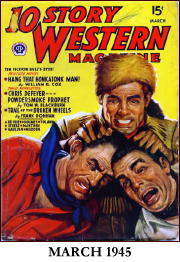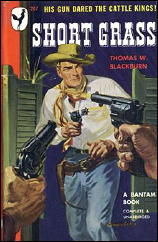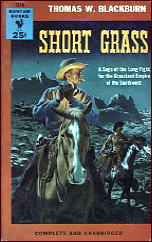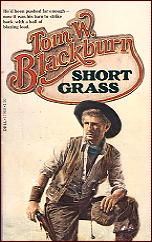Tue 11 Sep 2012
Western Review: TOM W. BLACKBURN – Short Grass.
Posted by Steve under Pulp Fiction , Reviews , Western Fiction[9] Comments

TOM W. BLACKBURN – Short Grass. Simon & Schuster, hardcover, 1947. Paperback reprints include: Bantam 207, November 1948; Bantam 1164, September 1953, Dell 7980, April 1973; Dell 17980, June 1979.
For no good reason I can think of, Tom Blackburn (1913–1992) is not included in the second edition of 20th Century Western Writers, and he should be. I am surprised that he is not. He was a prolific writer of westerns for the pulps, hardcovers, paperbacks, movies and a number of 50s and 60s TV series. His career began perhaps with “Wagontongue’s Last Town-Tamer†which appears in Star Western, February 1940, his earliest entry in the online FictionMags Index.
His wikipedia entry appears here, where you will learn that he may be best remembered as the person who wrote the lyrics to “The Ballad of Davy Crockett.†Among several other TV series he wrote for are Maverick, Bronco, and Daniel Boone. It’s quite a résumé.

And as a western, Short Grass is quite a novel, impressive in both its exposition and impact, with (in my opinion) as much emphasis on “novel†as “western,†and perhaps more. It starts out in flurry of action, and it barely ever lets up – perhaps only in the middle, with an ending that if properly filmed, would be a humdinger of a movie. (I’ll get back to this shortly.)
Steve Llewellyn is the primary protagonist, a wandering cowpoke – if not gunman, a drifter whose past we never learn much about – and an innocent bystander, if you will, who gets caught up in a shooting incident in a saloon between two other fellows. He’s wounded and – we’ve read this before – is soon found by a woman who takes him home to recover.

Things happen fast in this book. Other westerns may draw the next step out for any number of chapters, but Steve doesn’t wait nearly that long. He kisses Sharon Lynch on page 36, and in the Dell paperback I read, there still are almost 200 pages yet to come. The course of romance does not come easily, though. Steve believes in the use of his gun. Sharon does not. She does believe violence is the solution to anything. Not a good combination, and once she sees what Steve is capable of, she rejects him, and they part.
As a synopsis, this is too short and far too easy. The two are adults, and their behavior, their thoughts, their actions, their problems, are those of adults. When they meet later, in Kansas, not Texas, five years have passed, Steve has become a homesteader, Sharon has remarried (to a man too weak for her) and the local marshal (Ord Keown) has an eye on her.

Besides the complications a love triangle (well, yes, a quadrangle) can bring, the past that both Steve and Sharon have fled comes back to haunt them again in the form of rancher Hal Fenton. The latter is someone would not mind gaining some revenge as well as some open range for his cattle he and his men have brought up for market from Texas.
This is a tale with several twists and turns in it, surprisingly so, but it is the people involved that make the story so memorable. These are real people with real problems, and this being a western, only violence, sudden death and a fast and bloody shootout at the end can salvage any hope for them – the ones who survive, that is.
I suggested earlier that this movie would make a humdinger of a movie. I have not seen it yet, but I have it on order. The film that was made of this book is entitled Short Grass (Allied Artists, 1950), and the screenplay was written by none other than Mr. Blackburn himself. The names of the characters are the same, and the plot summary on IMDB suggests that very few changes were made. Rod Cameron stars as Llewellyn, Cathy Downs as Sharon Lynch, Johnny Mack Brown as Sheriff Ord Keown, with Morris Ankrum as Hal Fenton. I’ll report on my findings later. With stars like these, I’m hoping for the best.
September 11th, 2012 at 4:32 pm
This is an almost excellent film. I have a copy and have seen it several times. Rod Cameron is just fine in the lead, with Morris Ankrum and Alan Hale quite able. My only quibble is the concluding gunfight seems too dark. Always thought this was just my copy. In any case, well worth your time.
September 11th, 2012 at 6:03 pm
By “too dark,” Barry, do you mean in terms of mood, or in terms of lighting, with the final shootout coming at night? (From the context, I assume the latter, till I hear from you.)
September 11th, 2012 at 6:24 pm
In terms of lighting. The film does have a noirish quality that is positive. I could see this piece transposed to an urban setting.
September 11th, 2012 at 10:30 pm
Tom Blackburn also is not included in Jon Tuska’s ENCYCLOPEDIA OF FRONTIER AND WESTERN FICTION. But he makes up for it with a long 25 page biographical intro to THE TRAIL OF WHITENED SKULLS, which is available on amazon. If you click on the “look inside” feature, most of the introduction is available free.
September 11th, 2012 at 11:37 pm
Thanks for the pointer, Walker. I have the book in paperback, but I’d forgotten about that long piece about Blackburn that Tuska did for it. I read it when I got the book, but it had slipped my mind completely.
One thing I discovered when I re-read it just now is that my conjecture about Blackburn’s first published pulp story is way off. He was one of the western pulp writers who began their careers ghost-writing for Ed Earl Repp, who took the byline and a large chunk of the incoming paychecks.
This started for Blackburn in 1937 and continued until mid-1939, when he decided to strike out on his own. “Wagontongue’s Last Town-Tamer†may have been one of the first he had published under his own name, however.
The other thing I learned is that there was an earlier version of SHORT GRASS, though Tuska doesn’t mention the title of the novel version. It’s clear from the first sentence of Tuska’s long synopsis of “The Gun-Prophet of Helldorado” that it’s the same story, published in the February 1943 issue of ACTION STORIES.
I don’t always agree with Tuska on the merits of a story, only when he agrees with me, as he does this time, especially when he mentions “the maturity of the plot.”
September 11th, 2012 at 11:44 pm
Barry, Comment #3. I have the movie now, but I haven’t had a chance to watch it yet. I will as soon as I can.
I hadn’t thought that much about the story’s noirish qualities, but yes, there’s a touch of it, as there always is when a true romance dangles just out of reach of two lovers, especially when the setting is tough and/or violent, as it is in SHORT GRASS.
Which could be amplified if filmed properly, or made trite, if not. It’s good to know that it’s mostly the former, not the latter.
September 12th, 2012 at 4:30 pm
This is a very informative article!
Blackburn co-wrote some good Western movies: RIDING SHOTGUN, CATTLE QUEEN OF MONTANA.
Some of his TV scripts are good too: THE IMPOSTOR on Cheyenne (a bad guy impersonates Cheyenne, and our hero has to clear up the mysteries). And PORTRAIT OF A WIDOW on THE VIRGINIAN (a painter threatened by gamblers for his debts tries to swindle the amount out of a rich widow). These shows often seem to deal with situations not too closely tied to traditional Western plots.
I’ve never read any Blackburn prose. Sounds good!
October 23rd, 2013 at 8:17 pm
I just ran the Warner Archive edition of Short Grass which is an improvement over my other copy. Terrific picture.
September 23rd, 2017 at 5:03 am
From his 1955 novel Sierra Baron, James B. Clark directed in 1958 the movie by the same title, starring Brian Keith and Mala Powers.
Among his best novels I rate Navajo Canyon and A Good Day to Die.